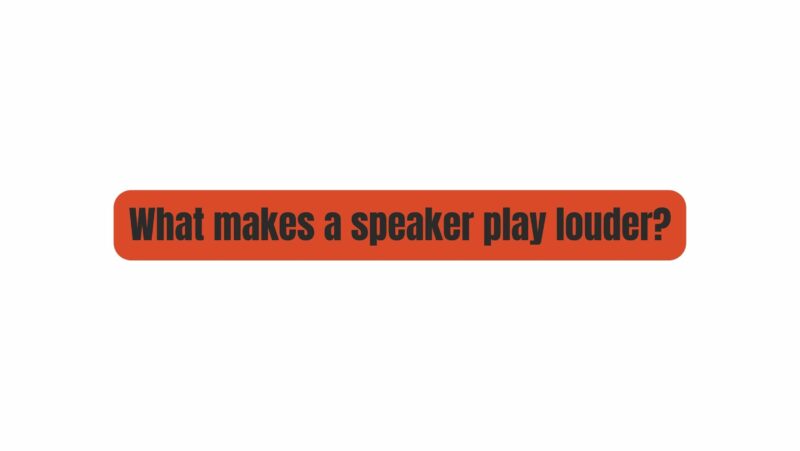The quest for loud and clear audio is a common pursuit for audiophiles and music enthusiasts alike. But what makes a speaker play louder? In this comprehensive guide, we’ll dive deep into the world of speaker technology, explore the factors that influence a speaker’s ability to produce high volumes, and reveal the secrets behind speaker volume.
1. Understanding Speaker Volume
Before we delve into what makes a speaker play louder, let’s clarify what we mean by speaker volume. Speaker volume refers to the perceived loudness or sound pressure level (SPL) produced by a loudspeaker. It is typically measured in decibels (dB) and is influenced by a combination of factors.
2. Speaker Wattage and Power Handling
One of the most commonly associated factors with speaker volume is wattage. Speaker wattage refers to the amount of electrical power a speaker can handle and convert into sound. Higher wattage speakers generally have the potential to play louder, but wattage alone doesn’t tell the whole story. We’ll explore the relationship between wattage and loudness.
3. Speaker Sensitivity and Efficiency
Speaker sensitivity, also measured in decibels (dB), is a crucial factor that influences loudness. It indicates how efficiently a speaker converts electrical power into sound. High-sensitivity speakers can produce higher volume levels with less wattage, while low-sensitivity speakers require more power to achieve the same loudness. We’ll delve into how speaker sensitivity impacts speaker volume.
4. Driver Size and Design
The size and design of the speaker’s driver, including the cone and magnet, play a role in determining loudness. Larger drivers generally move more air and can produce greater sound pressure, resulting in louder output. Additionally, the design of the driver and its components can influence the efficiency of sound production.
5. Amplifier Matching
To maximize loudness, it’s crucial to pair a speaker with an amplifier that can deliver the necessary power. Mismatched amplifiers can limit a speaker’s ability to play louder. We’ll discuss the importance of amplifier matching and how it affects loudness.
6. Enclosure Type
The type of speaker enclosure, whether it’s a sealed enclosure (closed-box), ported enclosure, or horn-loaded enclosure, can impact loudness and the overall sound characteristics of a speaker. We’ll explain how different enclosure types influence volume.
7. Equalization and Sound Processing
Modern speakers often incorporate advanced equalization and sound processing technologies that can enhance loudness without distortion. We’ll explore how these technologies work and their role in maximizing speaker volume.
8. Room Acoustics
The environment in which a speaker is placed has a significant impact on its perceived loudness. Room acoustics, including factors like sound-absorbing materials, reflective surfaces, and room dimensions, can either amplify or diminish the apparent volume of a speaker. We’ll discuss how room acoustics influence speaker volume.
9. Speaker Placement
The placement of a speaker within a room can affect its ability to play louder. Proper speaker placement can optimize sound distribution and maximize volume. We’ll provide tips on how to position speakers for optimal loudness.
10. Speaker Design and Engineering
Speaker manufacturers invest in advanced design and engineering to optimize loudspeaker performance. This includes materials, driver design, crossover networks, and cabinet construction. We’ll shed light on how these aspects contribute to a speaker’s ability to play louder.
11. Advanced Technologies
Emerging technologies, such as digital signal processing (DSP) and smart speaker algorithms, have revolutionized the way speakers produce sound. We’ll explore how these technologies impact loudness and audio quality.
12. Conclusion
In conclusion, what makes a speaker play louder is a multifaceted combination of factors, including wattage, sensitivity, driver size, amplifier matching, enclosure type, equalization, room acoustics, speaker placement, design, and advanced technologies. It’s important to note that achieving loudness should not come at the expense of audio quality, as a well-designed speaker balances both aspects.
Understanding the interplay of these factors and how they contribute to speaker volume can help you make informed choices when selecting speakers for your audio setup. Whether you’re a music enthusiast or a professional audio engineer, unlocking the secrets behind speaker volume can enhance your listening experience and elevate your appreciation of sound.


